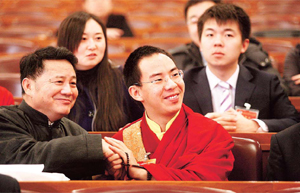Full text: Report on national economic, social development
(Xinhua)
Updated: 2010-03-16 14:14
5. We will work hard to conserve energy, reduce emissions and counter climate change, and quickly build a resource-conserving and environmentally friendly society.
1) We will tighten accountability for meeting targets and intensify oversight and inspection. We will continue to enforce an accountability system for energy conservation and emissions reduction, and initiate performance evaluations to test whether local governments and key enterprises are achieving their targets. We will increase supervision and inspection of energy conservation and emissions reduction efforts to ensure all facilities installed for these purposes are functioning effectively. We will carry out extensive publicity activities, such as the campaign to get everyone to save energy and reduce emissions.
2) We will improve relevant policies and standards. We will promptly introduce measures for assessing and examining energy savings in fixed-asset investment projects. We will formulate or revise a number of mandatory energy efficiency standards for the end-use of energy-consuming products, limits on energy consumption per unit of production, and technical standards for products that must be recycled by manufacturers. We will improve the systems for state certification and government procurement of energy-efficient products. We will speed up efforts to promote energy performance contracting. We will make sure that enterprises enjoy income tax credits for producing products that are designed to save energy and water and protect the environment, and likewise reward them for carrying out technological upgrading projects that contribute to energy conservation and environment protection. We will also make sure that power plants equipped with desulphurization devices charge a premium rate for electricity. We will improve economic policies to encourage the recovery of by-product heat and pressure to generate electricity, which in turn will be supplied to the power grid.
3) We will accelerate the development of key projects. We will continue work on the ten major energy conservation projects, with an additional energy savings equivalent to 80 million tons of standard coal. We will intensify efforts on major projects such as those to treat urban sewage and garbage, install desulphurization devices in coal-fired power plants and sintering machines in steel mills, and comprehensively address the problem of tailings. The daily urban sewage treatment and garbage disposal capacities will increase by 15 million cubic meters and 60,000 tons respectively in 2010, and this will ensure 75% of urban sewage is treated and 71% of urban garbage is safely handled, up 2.7 and 2 percentage points from last year respectively. We will implement the plan to comprehensively tackle heavy metal pollution.
4) We will improve energy conservation in buildings. We will tighten oversight and supervision to ensure new buildings comply with energy conservation standards, and introduce energy efficiency labeling and publicize energy saving information in non-industrial buildings. We will intensify efforts to install heat meters and temperature regulators in existing residential buildings and make them more energy-efficient in the northern heat-supply areas. We will improve supervision of energy conservation in the office buildings of state agencies and large public buildings.
5) We will comprehensively implement the project to promote energy-efficient products for the benefit of the people. In addition to subsidizing the purchase of high efficiency air-conditioners, we will formulate detailed rules to subsidize purchases of energy-efficient refrigerators, washing machines, flat-screen televisions, gas water heaters and electric motors to encourage their widespread use. A total of 150 million energy-efficient light bulbs will also be distributed, particularly in rural areas.
6) We will vigorously develop a circular economy. We will expand pilot projects that demonstrate the circular economy model, improve the circular economy index system, and set up a fund devoted to developing a circular economy. We will launch demonstration projects, such as the one on the recovery of mineral resources from waste in cities, formulate guidelines for developing the remanufacturing industry, vigorously encourage the recovery of resources from construction waste and kitchen waste, and comprehensively utilize straw as biomass energy. Water consumption per 10,000 yuan of value-added of industry will equal 114 cubic meters, a 2.1% decrease, and the rate of comprehensive utilization of industrial solid waste will rise by 1.8 percentage points to reach 68.4% in 2010.
7) We will strengthen ecological improvement and environmental protection. We will carry forward projects to bring the sources of dust storms affecting Beijing and Tianjin under control, protect virgin forests, and develop shelterbelts for key areas. We will intensify pollution prevention and control in the key areas and key water basins of the Huai, Hai and Liao rivers, the Tai, Chao and Dianchi lakes, the Bohai Sea, the Three Gorges Reservoir area, and the sources and routes of the South-to-North Water Diversion Project. We will move quickly to comprehensively clean up the environment on the Loess Plateau and protect and develop the ecological shields in Tibet. We will accelerate implementation of the plans for comprehensive ecological improvement, such as those to protect the sources of the Yangtze, Yellow and Lancang rivers, restore the ecosystem of the Shiyang River, and control the spread of stony deserts. Soil erosion on 21,600 square kilometers of land will be brought under control in 2010, up 1.4%. We will comprehensively improve the rural environment.
8) We will actively respond to climate change. We will formulate and implement policies and measures to meet our action targets for limits on greenhouse gas emissions by 2020. We will continue to implement China's National Climate Change Program. We will improve our capacity to respond to climate change and increase related publicity and education activities. We will accelerate the process of making our country green by planting trees and increase the capacity of forests to capture carbon emissions. An additional 5.92 million hectares of land will be covered with trees this year. We will improve our work concerning Clean Development Mechanism projects. We will continue to promote international talks on countering climate change, and strengthen international exchanges and cooperation.


